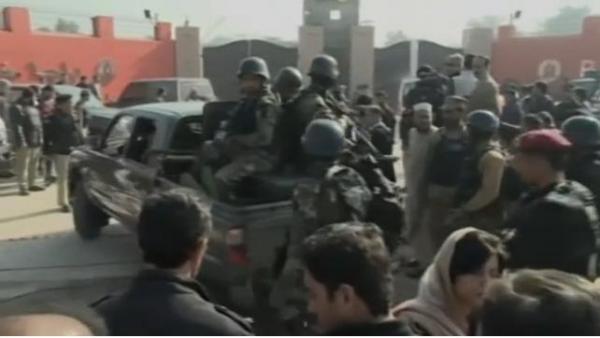
As Americans slept Tuesday night, militants stormed a northwestern Pakistan university and killed at least 20 people, while also injuring dozens more.
The Taliban took responsibility for the attack at first, Reuters reported, but it was later deemed "un-Islamic" by a Taliban spokesman.
The attack occurred at Bacha Khan University in the city of Charsadda. And though on the surface this may seem like another shooting at a public university, there may be a little bit more, as the attack happened during a poetry ceremony that was meant to commemorate the death anniversary of Bacha Khan - or Khan Abdul Ghaffar Khan, a pacifist and good friend of Ghandi, who helped fight for independence in Pakistan during the 20th century, Dawn reported.
As a result, some are saying this is an attack on Khan's legacy.
"Khan Abdul Ghaffar Khan is better remembered in India as Frontier Gandhi, and in Pakistan as Bacha Khan," Mukulika Banerjee wrote for Scroll. "Their relationship - both personal and political - holds profound lessons for the world today, just as their beleaguered legacies remain under constant attack, the latest of which was today in Pakistan."
Khan, who believed himself to be a secular Muslim, is often looked at as the "greatest nonviolent soldier of Islam" and "greatest nationalist leader" as he led a political movement to create a unique region within Pakistan for believers in a movement called "Khudai Khidmatgars," or Servants of God, Banerjee wrote.
And though the group's requests were denied, Khan continued to advocate for those believers, who eventually got their own region not long after Khan's death. He left Pakistan and followed some believers into Afghanistan years later before returning to Pakistan, Banerjee wrote.
While in Pakistan, Khan also looked to teach children for free by establishing a school in Utmanzai, an area of Pakistan, according to the Express Tribune.
"There was a shortage of teachers and funds for our school so I taught children myself," he wrote in his autobiography. "We started visiting villages to gather support for our school. This enraged the British rulers."
The school was later shut down after Khan's father argued with him over it, saying the idea of the school upset rulers in the area and it shouldn't be allowed, the Express Tribune reported.
Khan's clashes with government leaders didn't end there. As he made his way back into Pakistan for the end of his life, he still argued with rulers about such issues as women empowerment, education and policies before he died in 1988.
Khan's death was met with much appreciation. Pakistan even offered to bury his body next to Gandhi, which was "an unprecedented offer indicative of his prestige and stature," according to Banerjee. Khan decided to be buried in Jalalabad, an area in Afghanistan where he spent many of the latter days of his life.
Since that time, many in Pakistan still honor the leader for his nonviolent peace-keeping ways and for his ability to live out such a long life without succumbing to political power.
And though Tuesday's attack may have been an assault on his legacy, the power of Khan remains strong across Pakistan.
"Badshah Khan had continued to make criticisms of the policies and habits of governments in both India and Pakistan, but more than anything his survival into extreme old age was itself a living reminder of the austere ethos and self-dedication of that earlier generation of leaders, a tacit shaming of younger politicians grown fat with power," Banerjee wrote.
For more on education
Should schoolteachers be required to pay for services of unions they haven't joined?
26 baby names for your future genius

